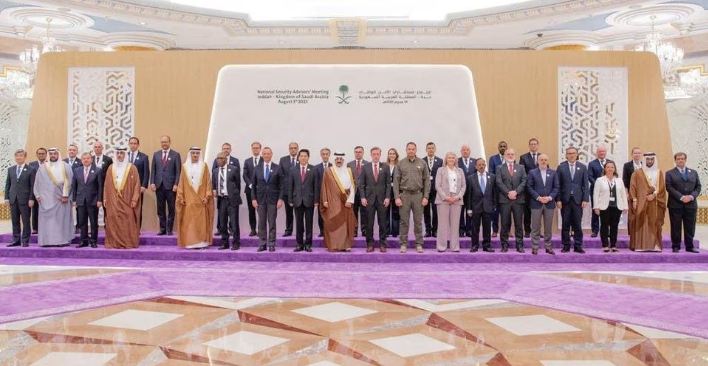Alwaght- After Turkish mediation and Chinese 12-point initiative to put an end to Ukraine war, this time Saudi Arabia is making a move to test its chance for mediation between Moscow and the West. Jeddah on Saturday and Sunday hosted peace talks for a solution for Ukraine crisis, complementing the peace talks last month held in Copenhagen.
In Jeddah meeting, national security advisers from more than 30 countries were present, discussing various dimensions of the war, including food and energy security, prisoner swap, environmental security challenges, and the setting up a war crimes court.
Observers suggest that Saudi Arabia is seeking to gather under a single format the main elements of the other initiatives proposed by China and African countries to build for itself international weight.
To check the aspects and outcomes of the Jeddah conference, Alwaght talked to Sayyed Reza Sadralhusseini, an international affairs expert.
Alwaght: What are Saudi goals behind mediation in this international conflict?
Sadralhusseini: The most important point that needs to be taken into account is the active diplomacy Saudi Arabia is undertaking as it is interested in playing an important role in issues related to Russia. As it is said in a majority of the world media, Saudi Arabia is distancing itself from the US and moving towards Russia, and Riyadh wants to balance its relationship with the East and the West. Essentially, Saudi Arabia is interested to continue its strategic relations with the Westerners, especially in energy, and at the same time maintain a logical and acceptable relationship in its foreign policy with Russia.
Given the fluidity of the international system, it is highly likely the power will shift from the West to the East and Saudi Arabia wants to take a balancing role in the international policy. This is why Riyadh started mediation between Russia and Ukraine and invited 30 countries in its arrangement of an international-level peace conference.
Alwaght: Amid escalating conflict between the two warring sides, how likely is the success of Jeddah conference?
Sadralhusseini: The result of this conference that was attended by national security advisers of 30 countries is not clear yet. In the past two days clashes between Russia and Ukraine escalated and Kiev launched attacks on the Russian warships in the Red Sea ports, and the Russians intercepted a number of Ukrainian drones attacking Moscow, and the Ukrainian casualties were reported rising. Therefore, it does not seem that this meeting will bring a definitive and comprehensive result. But there is room for hope, and it cannot be said that this conference will not have any effect on easing the tensions and clashes in the war. Still, it does not bring significant results.
One of the reasons why we cannot precisely envision success for this meeting is the stances of the leaders of the NATO member states who have not yet made their final decision about whether to allow the war to end or at least to de-escalate the clashes. We know that by the third month of the war, no weapons were left to Ukraine to continue the war, and it was the Western financial and military aid that propped it up and perpetuated the war , and so we cannot say with certainty that how far this conference can go with yielding a ceasefire.
Alwaght: What is the reason for Russian absence? How do the Russians view the Saudi mediation?
Sadralhusseini: One of the reasons of Russian absence is that Moscow has expressed its concerns with the NATO expansion eastward over the past three decades, and since the start of war on Ukraine, it made itself clear in this regard trough various ways. So, whether Russia was not invited or was not interested to take part, it shows that Moscow wants to make it crystal clear that in ceasefire case, those who caused the war should accept the ceasefire and contribute to peace talks for tangible results. Additionally,the absence from Jeddah meeting bore an opposition to the NATO expansion eastward.
Alwaght: In other words, we can conclude that the Russians are not hopeful about the conference yielding any results. Correct?
Sadralhusseini: We see the remarks and actions of the NATO leaders who keep providing military assistance to Ukraine, and in the eyes of the Russians, there is no hope for outcomes of Jeddah meeting as long as the Western supplies continue. But if this meeting formulates some conditions for friendly neighborliness relations between Russia and Ukraine and keeps away military threats to Moscow, the Russians will welcome the outcomes.



























